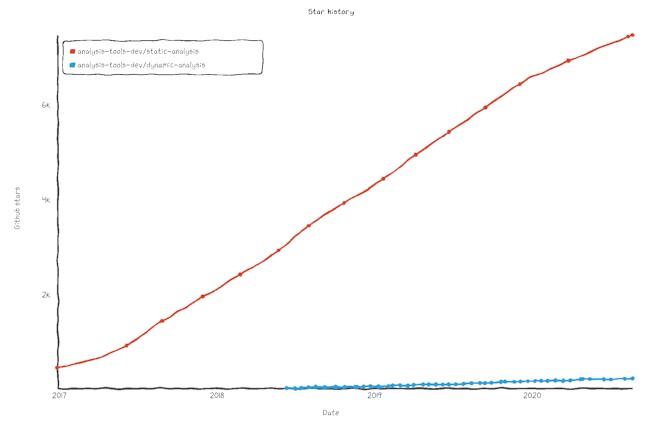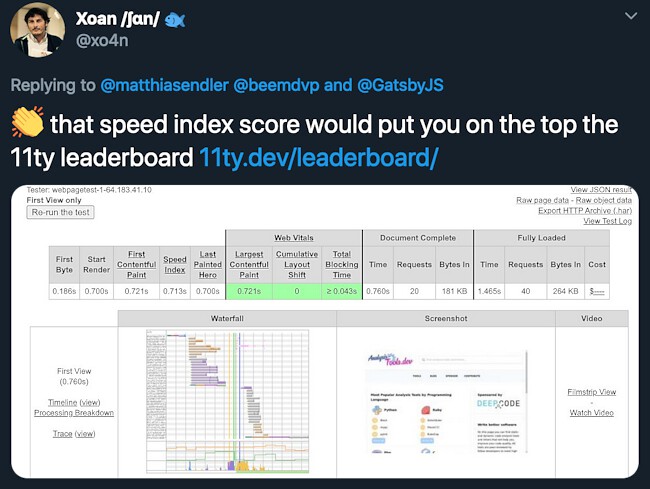Yesterday we launched analysis-tools.dev, and boy had I underestimated the response.
It’s a side project about comparing static code analysis tools. Static analysis helps improve code quality by detecting bugs in source code without even running it.
What’s best about the project is that it’s completely open-source. We wanted to build a product that wouldn’t depend on showing ads or tracking users. Instead, we were asking for sponsors on Github — that’s it. We learned a lot in the process, and if you like to do the same, keep reading!
First, Some Stats
Everyone likes business metrics. Here are some of ours:
- The project started as an awesome list on Github in December 2015.
- We’re currently listing 470 static analysis tools.
- Traffic grew continuously. Counting 7.5k stars and over 190 contributors at the moment.
- 500-1000 unique users per week.
- I had the idea to build a website for years now, but my coworker Jakub joined in May 2020 to finally make it a reality.

Source: star-history.t9t.io
“Why did it take five years to build a website!?”, I hear you ask. Because I thought the idea was so obvious that others must have tried before and failed.
I put it off, even though nobody stepped in to fill this niche.
I put it off, even though I kept the list up-to-date for five years, just to learn about the tools out there.
You get the gist: don’t put things off for too long. When ideas sound obvious, it’s probably because they are.
Revenue Model
It took a while to figure out how to support the project financially. We knew what we didn’t want: an SEO landfill backed by AdWords. Neither did we want to “sell user data” to trackers.
We owe it to the contributors on Github to keep all data free for everyone. How could we still build a service around it? Initially, we thought about swallowing the infrastructure costs ourselves, but we’d have no incentive to maintain the site or extend it with new features.
Github Sponsors was still quite new at that time. Yet, as soon as we realized that it was an option, it suddenly clicked: Companies that are not afraid of a comparison with the competition have an incentive to support an open platform that facilitates that. Furthermore, we could avoid bias and build a product that makes comparing objective and accessible.
Sponsoring could be the antidote to soulless growth and instead allow us to build a lean, sustainable side business. We don’t expect analysis-tools.dev ever to be a full-time job. The market might be too small for that — and that’s fine.
Tech
Once we had a revenue model, we could focus on the tech. We’re both engineers, which helps with iterating quickly.
Initially, I wanted to build something fancy with Yew. It’s a Rust/Webassembly framework and your boy likes Rust/Webassembly…
I’m glad Jakub suggested something else: Gatsby. Now, let me be honest with you: I couldn’t care less about Gatsby. And that’s what I said to Jakub: “I couldn’t care less about Gatsby.” But that’s precisely the point: not being emotionally attached to something makes us focus on the job and not the tool. We get more stuff done!
From there on, it was pretty much easy going: we used a starter template, Jakub showed me how the GraphQL integration worked, and we even got to use some Rust! The site runs on Cloudflare as an edge worker built on top of Rust. (Yeah, I cheated a bit.)
Count to three, MVP!
Finding Sponsors
So we had our prototype but zero sponsors so far. What started now was (and still is) by far the hardest part: convincing people to support us.
We were smart enough not to send cold e-mails because most companies ignore them. Instead, we turned to our network and realized that developers reached out before to add their company’s projects to the old static analysis list on Github.
These were the people we contacted first. We tried to keep the messages short and personal.
What worked best was a medium-sized e-mail with some context and a reminder that they contributed to the project before. We included a link to our sponsors page.
Businesses want reliable partners and a reasonable value proposal, so a prerequisite is that the sponsor page has to be meticulously polished.
Just like Star Wars Episode IX, we received mixed reviews: many people never replied, others passed the message on to their managers, which in turn never replied, while others again had no interest in sponsoring open-source projects in general. That’s all fair game: people are busy, and sponsorware is quite a new concept.
A little rant: I’m of the opinion that tech businesses don’t nearly sponsor enough compared to all the value they get from Open Source. Would your company exist if there hadn’t been a free operating system like Linux or a web server like Nginx or Apache when it was founded?
There was, however, a rare breed of respondents, which expressed interest but needed some guidance. For many, it is the first step towards sponsoring any developer through Github Sponsors / OpenCollective.
It helped that we use OpenCollective as our fiscal host, which handles invoicing and donation transfers. Their docs helped us a lot when getting started.
The task of finding sponsors is never done, but it was very reassuring to hear from DeepCode - an AI-based semantic analysis service, that they were willing to take a chance on us.
Thanks to them, we could push product over the finishing line. Because of them, we can keep the site free for everybody. It also means the website is kept free from ads and trackers.
In turn, DeepCode gets exposed to many great developers that care about code quality and might become loyal customers. Also, they get recognized as an open-source-friendly tech company, which is more important than ever if you’re trying to sell dev tools. Win-win!
Marketing
Jakub and I both had started businesses before, but this was the first truly open product we would build.
Phase 1: Ship early 🚀
We decided for a soft launch: deploy the site as early as possible and let the crawlers index it. The fact that the page is statically rendered and follows some basic SEO guidelines sure helped with improving our search engine rankings over time.
Phase 2: Ask for feedback from your target audience 💬
After we got some organic traffic and our first votes, we reached out to our developer friends to test the page and vote on tools they know and love. This served as an early validation, and we got some honest feedback, which helped us catch the most blatant flaws.
Phase 3: Prepare announcement post 📝
We wrote a blog post which, even if clickbaity, got the job done: Static Analysis is Broken — Let’s Fix It! It pretty much captures our frustration about the space and why building an open platform is important. We could have done a better job explaining the technical differences between the different analysis tools, but that’s for another day.
Phase 4: Announce on social media 🔥
Shortly before the official announcement, we noticed that the search functionality was broken (of course). Turns out, we hit the free quota limit on Algolia a biiit earlier than expected. 😅 No biggie: quick exchange with Algolia’s customer support, and they moved us over to the open-source plan (which we didn’t know existed). We were back on track!
Site note: Algolia customer support is top-notch. Responsive, tech-savvy, and helpful. Using Algolia turned out to be a great fit for our product. Response times are consistently in the low milliseconds and the integration with Gatsby was quick and easy.

Clearly, everyone knew that we were asking for support here, but we are thankful for every single one that liked and retweeted. It’s one of these situations where having a network of like-minded people can help.
As soon as we were confident that the site wasn’t completely broken, we set off to announce it on Lobste.rs (2 downvotes), /r/SideProject (3 upvotes) and Hacker News (173 upvotes, 57 comments). Social media is kind of unpredictable. It helps to cater the message to each audience and stay humble, though.
The response from all of that marketing effort was nuts:
Perhaps unsurprisingly, the Cloudflare edge workers didn’t break a sweat.
My boss Xoan Vilas even did a quick performance analysis and he approved. (Thanks boss!)
High fives all around!
Now what?
Of course, we’ll add new features; of course, we have more plans for the future, yada yada yada. Instead, let’s reflect on that milestone: a healthy little business with no ads or trackers, solely carried by sponsors. 🎉
Finally, I want you to look deep inside yourself and find your own little product to work on. It’s probably right in front of your nose, and like myself, you’ve been putting it off for too long. Well, not anymore! The next success story is yours. So go out and build things.
Oh wait! …before you leave, would you mind checking out analysis-tools.dev and smashing that upvote button for a few tools you like? Hey, and if you feel super generous today (or you have a fabulous employer that cares about open-source), why not check out our sponsorship page?